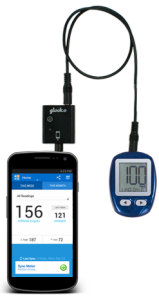

The proliferation of connected devices, coupled with rapid advances in data analytics and sensor technology, has fundamentally changed the way people interact with and manage their health. Thanks to smartphones and a new generation of smart, wearable gadgets, it’s now easier than ever before to monitor and and analyze a dizzying array of inputs and physiological signals and inputs — from your heart rate and calorie intake to your biorhythms and stress levels.
The promise of today’s health apps is that, by leveraging mobility and realtime analytics, they can help Average Joes like you and me transform biometric data into something more substantial Information, knowledge and changes in behavior. While the market continues to brim with all manners of behavioral change and health management apps, only a tiny fraction of startups are addressing an area in which health management and tracking technology could (arguably) have the greatest impact: Chronic diseases and conditions.
Glooko launched in late 2011 to bring mobility and data tracking to people living with Diabetes, a population underserved by advances in mobile technology. After all, Diabetes, like any chronic condition, by nature requires constant monitoring from patients — across a number of devices. So, the company set out on a mission to address the lack of interoperability and standardized methods for data transfer among devices (and glucose meters) to finally create a unified diabetes management solution.
 The effort has begun to pay off, as Glooko now supports data transfer between 26 glucose meters and 28 different mobile devices. For some perspective, compatibility with 26 meters means that it covers roughly 85 percent of existing meters in the U.S., says Glooko’s Vikram Singh. In November, on the heels of approval from the FDA, Glooko took another big step toward device agnosticism, expanding its support from iOS to Android devices — a move which the company says makes it the the “only FDA-cleared mobile diabetes management system to support the transfer of glucose data from dozens of meters to Android devices.”
The effort has begun to pay off, as Glooko now supports data transfer between 26 glucose meters and 28 different mobile devices. For some perspective, compatibility with 26 meters means that it covers roughly 85 percent of existing meters in the U.S., says Glooko’s Vikram Singh. In November, on the heels of approval from the FDA, Glooko took another big step toward device agnosticism, expanding its support from iOS to Android devices — a move which the company says makes it the the “only FDA-cleared mobile diabetes management system to support the transfer of glucose data from dozens of meters to Android devices.”
With its coverage increasing, the company is ready to take the next big step, says CEO Rick Altinger, thanks to the help of a few familiar names in the world of mobile technology. Today, the company announcement that it has raised $7 million in a Series A-1 financing round from investors that include Samsung Venture Investment Company and Lifeforce Ventures, with participation from existing investors, The Social + Capital Partnership, Sundeep Madra and Yogen Dalal, among others.
With its new capital in tow, which brings its total to around $11.5 million, Glooko will focus on the next phase of data tracking technology applied to health: Predictive care. In order to have the biggest possible impact, Glooko will look to leverage its patient datasets to enable predictive diabetes care by delivering both patient data and decision-making algorithms to health providers and payer groups, Altinger says.
With the help of a huge mobile player like Samsung, Glooko believes that it can begin to liberate blood glucose data from meters and make it more accessible to both patients and health providers. Going forward, the company will look to scale its diabetes management system across the globe, while adding a predictive layer of analytics and messaging that it hopes will allow healthcare providers to make therapeutic recommendations to its patients in realtime.
As it stands today, Glooko’s system now includes its “MeterSync Cable” and applications for both iOS and Android, which combined, allow data to be transferred from meters directly to a user’s mobile device. The apps then integrated directly into the existing Glooko management web dashboards, enabling healthcare providers and care management teams to remotely monitor at-risk patients.
By doing so, Glooko is hoping to provide health systems and disease management organizations with access to better population management and analytics tools that can allow them to both increase focus on at-risk patients and, over the long-run, achieve higher levels of adherence to treatment plans. By focusing on increasing involvement of healthcare providers, Glooko also sees a path towards monetization, as it could begin charging health insurance companies a subscription fee for access to tools that allow them to better execute managed care (and higher savings).
For more, find Glooko at home here.
Read more : After Arriving On Android, Glooko Lands $7M From Samsung & More To Bring Predictive Diabetes Care Global


0 Responses
Stay in touch with the conversation, subscribe to the RSS feed for comments on this post.